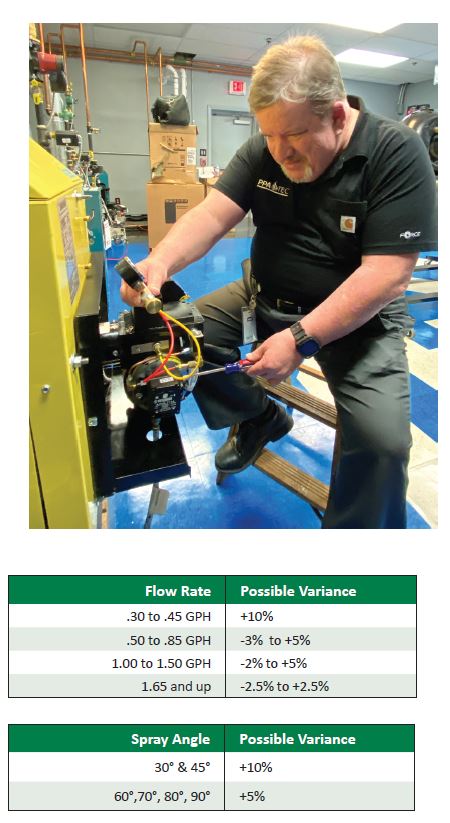Written on: July 18, 2022 by Alan Mercurio

With today’s flame retention burners and smaller combustion chambers, it’s crucial to understand the effects that increasing fuel pump pressure can have on a system. This would include possible incomplete combustion that could lead to the production of carbon monoxide (CO).
Tolerances
Something you should know is the tolerances nozzles fall within. For example, if you had a system with a maximum firing rate of 1.20 gallons per hour (GPH), and you decide it would be better to install a 1.00 GPH nozzle, you increase the fuel unit pressure to 145 pounds per square inch (PSI) and you will be back to 1.20 GPH with the smaller nozzle. Or will you?
Nozzles from 1.00 GPH to 1.50 GPH can have
a tolerance of -2% to +5%.
If the 1.00 GPH nozzle you installed was +5% at 145 PSI, your actual firing rate would be 1.26 GPH. Again, this could lead to a system cycling on high-limit, and/or worse yet, the incomplete combustion that will lead to the production of CO.
Now, with a better understanding, if you were increase the pump PSI to only 120 PSI, you will find this will only bring the 1.00 GPH nozzle to 1.10 GPH. Even if it was over by 5%, it would still only be approximately 1.155 GPH, still well under the maximum firing rate.
Spray pattern
Here is something else to think about. Did you know when you increase your pump pressure the spray pattern gets shorter and the angle will become wider?
This means your 80° nozzle may have just become an 84° nozzle. You may have done this because the flame was impinging on the back wall of the chamber. Unfortunately, now it may be impinging on two sides of the chamber. In this, case you may have wanted to change the nozzle to a 70°.
These are the reasons why it’s so important to understand this and to always, after any adjustments are made to the burner, including changing the nozzle, perform a combustion analysis. ICM
Alan Mercurio, Lead Technical Trainer & Assistant Director PPATEC, a division of the Pennsylvania Petroleum Association. Email: amercurio@papetroleum.org; phone: 717-939-1781 ext. 101 or on PPATEC’s Facebook Page.